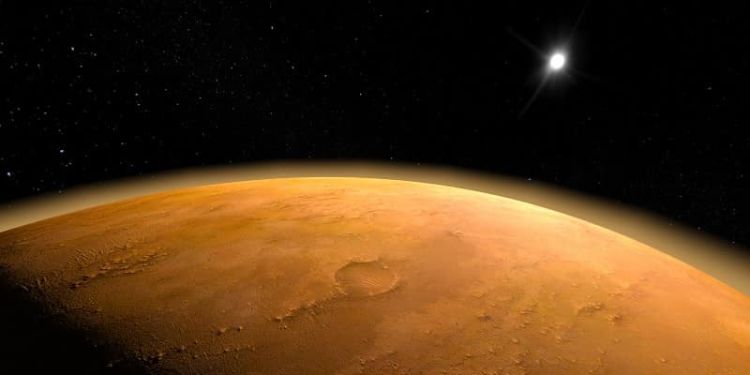Planetary Exploration

We are a cross-institute research group aimed at bringing together researchers from across a range of disciplines to investigate planetary science. With group members from the Institute of Applied Geoscience, Institute of Geophysics and Tectonics, Earth Surface Science Institute and Institute for Climate and Atmospheric Science, we cover a range of expertise and research interests which include:
- Planetary Volcanic Systems and Geomorphology (surface and near-surface processes)
- Planetary Magnetism
- Martian Fluvial Systems
- Planetary Atmospheres
- Meteorites: Planet Formation and Evolution
For more detailed information about our research please see below. For more information about our group contact research group leader Dr Emma Bramham.
Main research areas
Planetary volcanic systems and geomorphology (surface and near-surface processes)
Our interests lie in deciphering volcanic system behaviour across a range of planetary environments. We use our knowledge of volcanic systems on Earth alongside remote sensing data from other planetary bodies such as Mars, to develop an understanding of the influences of key parameters such as surface gravity and lithospheric strength on volcanic system behaviour. We combine a range of expertise and skills such as remote sensing data processing and analysis, surface structure modelling, volcanic modelling and sub-surface geophysical processing and interpretation to allow us to take advantage of the available planetary data to address key questions. Principal academic staff in this area are: Emma Bramham, Mark Thomas, Hannah Bentham, Douglas Paton, Sandra Piazolo.
Planetary magnetism
The planets within our solar system all have remarkably different self-generated magnetic fields. Using Earth as our nearest example, we study the diverse range of internal structures and dynamics of planets and other bodies, along with their dynamo mechanisms and associated magnetospheres. Principal academic staff in this area are: Jon Mound, Chris Davies, Phil Livermore, Stephen Stackhouse.
Martian fluvial systems
Our interests are in the geomorphology and flow processes associated with Martian channels and drainage networks. Principal academic staff in this area are: David Hodgson, Jeff Peakall.
Planet formation and evolution: Learning from meteorites
Meteorites represent a unique source of information regarding the formation and evolution of planets. We study a large variety of meteorites to learn about planetary formation, planetary differentiation and surface processes. Processes looked at include core formation, impact related differentiation, gas-chondrule interaction, lava flow dynamics on Mars etc. Techniques include geochemistry including isotopic and trace element studies, detailed crystallographic and chemical variations from the nanoscale to the microscale utilizing the excellent high end microscopy and geochemical analytical capabilities at the University of Leeds (LaICPMS, TIMS, EBSD, EDS) and analysis available at UKs national facilities. Principal academic staff in this area are: Jason Harvey, Thomas Mueller, Sandra Piazolo, Chris Davies, Jon Mound.
Planetary atmospheres
The atmospheres of the planets in our solar system are remarkably different with hugely variable compositions, temperatures and pressures. We are specifically interested in clouds that form on other planets and apply our knowledge of clouds on Earth to better understand these alien clouds. These clouds can be strikingly different to clouds on Earth. For example, ice clouds on Mars can be composed of its atmosphere’s main component, carbon dioxide ice. Principal academic staff in this area: Ben Murray.
Contact us
If you would like to discuss an area of research in more detail, please contact Dr Emma Bramham.

